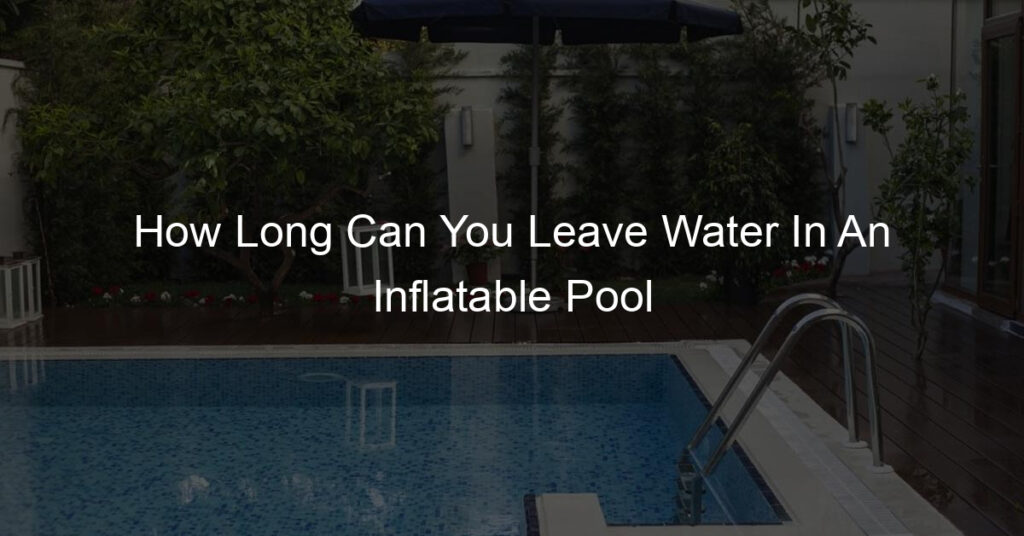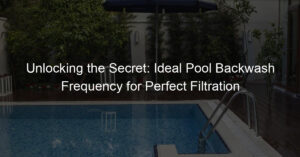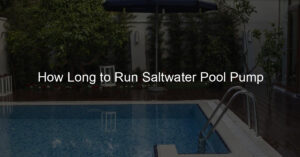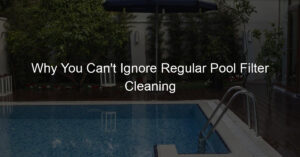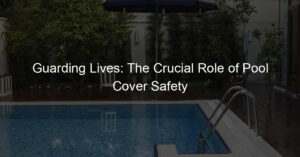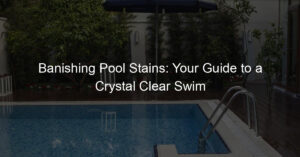Introduction: The Relevance of Pool Water Maintenance
The maintenance of pool water is of utmost importance to ensure a healthy and enjoyable swimming experience. Prolonged use of the same water in an inflatable pool can lead to the growth of bacteria, algae, and the accumulation of other contaminants.
Understanding how long you can leave water in an inflatable pool and the factors that influence its longevity is crucial to maintaining a clean and safe environment for your family and friends. It isn’t just about the visual appeal of crystal clear water, but it also significantly impacts the health and well-being of the pool users.
Factors That Influence Water Longevity in an Inflatable Pool
Several factors play a role in determining the longevity of water in an inflatable pool. These include the frequency of pool use, the number of swimmers, the environment around the pool, the type and efficiency of the pool filtration system, and whether or not the pool is covered when not in use. Other elements like the exposure to sunlight, water treatment methods employed, and the overall quality of the initial water source also contribute to the lifespan of the water in your pool.
Importance of Regular Water Change in Inflatable Pools
Regular water changes in inflatable pools are paramount to maintain the water’s health and cleanliness. Without regular water changes, contaminants such as dust, leaves, bacteria, and microorganisms can accumulate and affect water quality.
Not only can this lead to skin and eye irritations among swimmers, but it also fosters the perfect environment for the proliferation of waterborne diseases. Depending on usage and environmental conditions, experts recommend changing the water in your inflatable pool every two weeks.
The Impact of Temperature on Pool Water
Temperature can significantly impact the quality of your pool water. Warm temperatures speed up the growth of bacteria and algae, leading to cloudy or green water if not treated properly. This is why inflatable pools often require more frequent water changes during the summer months. Moreover, if the pool water gets too warm, it can become a breeding ground for harmful pathogens, potentially posing health risks to the swimmers.
Role of Pool Size in Determining Water Longevity
The size of the inflatable pool also influences water longevity. Smaller pools often need more frequent water changes because they can get contaminated quickly. On the other hand, larger pools have a larger volume of water which dilutes the contaminants, potentially allowing for longer periods between water changes. However, larger pools also require more chemicals to treat the water, and improper treatment can lead to water quality issues over time.
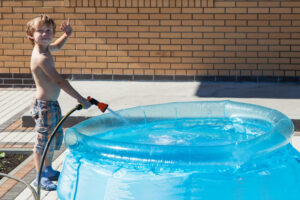
Effects of Contaminants on Pool Water
Different contaminants can negatively impact the water quality in an inflatable pool. These can range from organic materials like leaves, grass, and bugs, to inorganic materials such as dust and sunscreen residue.
Also, bacteria and other pathogens introduced by swimmers can also degrade the water quality. All these contaminants can change the water’s chemical balance, lead to cloudiness, cause unpleasant odors, and even encourage the growth of harmful microorganisms.
How Sun Exposure Influences Water Quality
Exposure to sunlight not only increases the water temperature but also accelerates the breakdown of certain pool chemicals. Chlorine, a common pool sanitizer, is highly susceptible to degradation by UV rays.
As chlorine levels decrease, the pool becomes less capable of killing bacteria and algae, which can rapidly multiply in warm, untreated water. This is why pools in sunny locations or without shade require more frequent monitoring and water treatment.
The Potential Health Risks of Stagnant Pool Water
Stagnant pool water poses numerous health risks. As water sits in a pool over time without adequate circulation or treatment, it can become a breeding ground for bacteria, viruses, and parasites.
These microorganisms can cause a variety of health issues, ranging from minor ailments like ear infections and athlete’s foot to more severe conditions such as gastrointestinal diseases or even Legionnaires’ disease. This underscores the importance of regular water changes and proper water treatment in inflatable pools.

How the Use of Pool Covers Prolongs Water Life
Pool covers can significantly extend the lifespan of pool water by preventing the introduction of external contaminants. By keeping out leaves, dust, insects, and other debris, pool covers reduce the strain on the pool’s filtration system and limit the growth of algae. Furthermore, covers can also minimize water evaporation and the resultant concentration of pool chemicals, ensuring that your pool water remains balanced and safe for a longer time.
Preventing Algae Growth in Inflatable Pools
Algae growth can be a persistent issue in inflatable pools if the water is not regularly replaced or treated with the appropriate pool chemicals. Algae spores can enter the pool through various means, such as wind, rain, or even on swimmers’ bodies.
Once in the pool, without the presence of sanitizing chemicals, these spores can grow and multiply rapidly, especially in warm conditions. Regular water testing and treatment, combined with physical cleaning, can help prevent algae growth and maintain the cleanliness of your pool.
The Impact of Pool Usage Frequency on Water Longevity
The frequency with which your inflatable pool is used plays a significant role in determining water longevity. The more often the pool is used, the more contaminants are introduced into the water, from body oils and sunscreen to bacteria and other pathogens. As a result, pools that are used daily or by large numbers of people may require more frequent water changes or more robust water treatment protocols to maintain water quality.
Chemical Treatments for Inflatable Pool Water
Chemical treatments can significantly extend the lifespan of inflatable pool water by killing bacteria, controlling algae, and maintaining a balanced pH. Chlorine is commonly used due to its effectiveness as a disinfectant.
However, its levels must be carefully monitored, as too little can leave the water unsafe, while too much can cause skin and eye irritation. Other treatments include bromine, which is less affected by UV light than chlorine, and saltwater systems that generate chlorine from salt.
Role of pH Balance in Maintaining Pool Water
Maintaining a balanced pH in your inflatable pool is crucial for both the effectiveness of the sanitizing chemicals and the comfort of the swimmers. A pH level between 7.2 and 7.8 is ideal as it enhances the disinfecting power of chlorine and is gentle on the skin and eyes.
High pH can lead to cloudy water and scale formation, while low pH can cause corrosion and skin irritation. Regular testing and adjustment of pH, typically using soda ash or sodium bicarbonate for raising pH and muriatic acid or sodium bisulfate for lowering pH, can ensure a well-maintained pool.

How Long Can You Leave Untreated Water in Your Pool
Untreated water in an inflatable pool should not be left standing for more than a few days. This is because untreated water can quickly become a breeding ground for bacteria, algae, and other microorganisms, especially in warm weather. Not only can this result in cloudy, greenish water that’s unappealing for swimming, but it can also pose a health risk to swimmers. Therefore, regular water treatment or replacement is necessary to keep the water safe and clean.
When to Change the Water in Your Inflatable Pool
The exact timing for changing the water in your inflatable pool depends on several factors, including the frequency and intensity of use, the weather, and the effectiveness of your water treatment. However, as a general guideline, if the pool is used frequently, the water should be replaced every one to two weeks. If the pool is seldom used and covered when not in use, the water might last up to a month with proper chemical balance and filtration.
Costs Associated with Regular Pool Water Changes
While regular water changes are essential for maintaining a clean and safe pool, they do come with costs. The most apparent is the cost of the water itself, which can be substantial, especially in regions with high water rates. Additionally, there’s the cost of the chemicals needed to treat the new water and the energy costs associated with filling the pool and running the filtration system. Therefore, pool owners should consider these costs when planning their pool maintenance schedule.
Innovative Solutions to Extend Pool Water Life
Several innovative solutions can help extend the life of your pool water. These include UV sterilizers, which use ultraviolet light to kill bacteria and other pathogens, and mineral sanitizers, which use minerals like silver and copper to sanitize the water. Another option is to use a pool ozone generator, which injects ozone into the pool to kill bacteria and break down contaminants. These methods can be used in conjunction with traditional chemical treatments to maintain high water quality for longer periods.

The Environmental Impact of Frequent Water Changes
Frequent water changes in inflatable pools also have an environmental impact. They can lead to significant water wastage, particularly during periods of drought or water restrictions. Furthermore, the water drained from pools can contain chemicals that could harm local flora and fauna if not properly treated before disposal. As a result, pool owners should seek to balance the necessity of water changes with the potential environmental impacts.
Conclusion: Best Practices for Inflatable Pool Maintenance
In conclusion, maintaining the water quality in your inflatable pool involves a combination of regular water changes, chemical treatments, and other preventive measures. Keeping an eye on the pool’s pH level, ensuring the pool is covered when not in use, and using innovative sanitization methods can all help extend the life of your pool water. Despite the costs and environmental considerations, frequent water changes and proper water maintenance are crucial to provide a safe and enjoyable swimming experience.
Frequently Asked Questions About Pool Water Longevity
This section could include common questions that pool owners might have regarding water longevity. Some examples could be “Can I use household bleach to treat my pool water?”, “How do I know when to change the water in my pool?”, or “How can I prevent algae growth in my inflatable pool?”. Providing detailed answers to these frequently asked questions can help pool owners better understand how to care for their pools and ensure the water remains clean and safe for use.
Conclusion
Maintaining water quality in an inflatable pool is an essential aspect of pool ownership that demands understanding and attention. Factors such as temperature, sunlight exposure, pool usage, and size play crucial roles in determining water longevity. Regular water changes are indispensable in preventing the accumulation of contaminants and harmful microorganisms. Chemical treatments and maintaining a balanced pH are integral to preserving the health of the pool water and, consequently, the swimmers.
Innovative solutions like UV sterilizers, mineral sanitizers, and ozone generators can further enhance water longevity and quality. Yet, one must also consider the costs associated with these regular changes and treatments, as well as their environmental impact. Through this post, we hope to have shed light on the importance of proper pool water maintenance and the various factors influencing it. Ensuring these practices can significantly enhance the swimming experience, keeping the inflatable pool a source of joy and refreshment rather than a health concern.

